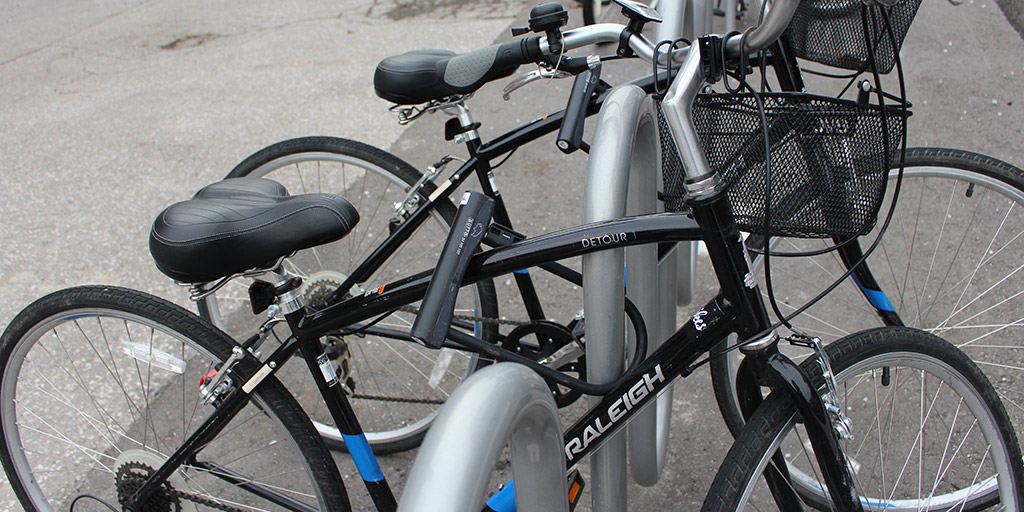Bikes stolen from post-secondary campuses becoming a common occurrence
 CREDIT: MELISSA NOVACASKA
CREDIT: MELISSA NOVACASKABike thieves are in the rise on post-secondary campuses, but Fanshawe's special constables have a strong message to help students protect their bikes.
There have been a chain of bike thefts going on around Fanshawe College, Western University and other campuses, and it is causing alarm.
Fanshawe is just one campus being targeted by criminals looking to steal bikes.
“The bikes were stolen from the bike racks. There are numerous bike racks around the college; there is D south, there’s the Security and Control Center right by the Wellness Center, one on Technology Drive between buildings B and C, and there is Apprentice Drive as well. Any bike rack open to the public are where the bikes were stolen from,” Fanshawe Special Const. Jeff Cook of Campus Security Services explained in a phone interview.
He went on to explain further, saying “We didn’t have any thefts from the secured storage facility bike cage. The bike cage is open to all of our students as well.”
The most common way the bikes were stolen was by having the chains cut off the bikes with a tool, such as side-cutters, tin snips, or bolt-cutters. Cook shared his insight as to how the bike thieves are able to unsecure the bikes.
“The chains [on the bikes] were cut 99.9 per cent of the time its an easy cut; the bike lock isn’t a very high quality one, it would be one just from the dollar store, or one that’s 20 dollars or less, that’s basically just a small wire cable, and basically no thicker than a quarter of an inch to three eights of an inch, and can be cut with a pair of tin snips or side-cutters you can get at the dollar store for a dollar fifty. It’s not an elaborate scheme, its pretty quick and easy,” Cook said.
Jordan Costa, a previous student at Carleton University, has experienced first hand the negative effects that bike thefts can have on a student’s life. While attending Carleton University in Ottawa, he had his bike stolen from the campus.
“[My bike] was stolen around the end of September 2016. I bought the bike in the summer, just months before hand, so I think I had it for about four months. I spent quite a bit on it, it was a nice mountain bike, and it was about 600 dollars plus tax. It wasn’t a cheap-o super cycle or something,” he said.
Costa went on to explain further. “It was great- I used it for the summer, got back and fourth to work no problem. I was going to Carleton University at the time, it was my final year; I pulled up, locked it where all the other bikes were locked up, I used a big lock, you know, I didn’t just leave it there. I went to my three hour lecture, came back, it was the middle of the day, between [2 p.m. and 5 p.m.]. It was gone, It was locked up and everything,” Costa said.
“I did the whole spiel where you look around the school, you’re trying to find out if you’re crazy, you’re trying to find out if you parked your bike somewhere else and you think you’re crazy, but no, that wasn’t the case,” Costa said.
The way Costa’s bike was stolen from the Carleton University campus is consistent with the way the bikes were stolen on Fanshawe College and Western University’s campuses.
“Someone took a pair of bolt cutters and sliced [the lock] right off,” Costa said. “It’s terrible too when you’re a student, because you pay tonnes of money for your books, tonnes of money for rent, tonnes of money on tuition, you scrounge up enough savings to buy yourself a piece of transportation, and someone spends four minutes of their day to take it away from you.”
Costa submitted a police report for his stolen bike, however, the investigation only lasted two weeks before police called it off, and Jordan was forced to purchase a new expensive bicycle. The campus security and police officers had warned him that bike thefts are a common occurrence.
Campuses are a goldmine for thieves who intend to steal bikes because of the high concentration of students who use bikes as their main modes of transportation. As well, the thieves are able to speculate that the bike owner will be away from their bike for a sufficient amount of time, considering that the student is most likely in classes or lectures. Campuses are also a good bet for criminals looking to find a bike with a low quality lock.
Cook shared some excellent advice for students who wish to avoid becoming a victim of on-campus bike thefts.
“For a prevention tip, I would recommend to buy a higher quality lock. A lot of the locks that are about $50 and above come with a registration card, so you can register it online with the serial number, make, model, how much you paid for it, and they’ll come with an insurance rider. When I bought my bike, my lock came with a $100 insurance policy, as long as I bought the lock and registered it.”
Cook had some final words to share with students.
“Know how to secure [your bike], buy a good quality lock, take some photographs of it and the serial number, the make, the model, just for future reference. Park it in a high traffic area, secure it well, and that’s it,” Cook concluded.
Stay vigilant students, your mode of transportation may be at risk.














